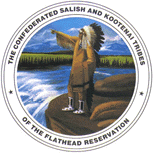John Philip Sergeant, from Pickering, Ontario, sent us a very interesting Family History (we adapted it for publication), that was written in September 1983, by his grandmother, Marguerite Leonora Choquette. It tells about the fascinating life of Laurent Henri Choquette, who was the first white doctor the Flathead tribe of Montana had ever had. The story of Laurent Henri's son, Laurent Robert (photo on the right), is also recounted.
LAURENT HENRI son of Henri Choquet and Delphine Laurent was born August 9, 1843, in Varennes, Quebec. He
was a very friendly boy and well liked. When he was in school
the art professor became interested in him as he had a very promising
voice. He helped Henri and after a few years training, he
became quite a good singer. He sang in the church choir and
was often asked to sing at local concerts. He used to read
a great deal and his favorite books were those written on the adventures
of the new west. He was intrigued by these stories and dreamed
of seeing the west. This was about the time the slogan "Go
west young man" originated. He became a doctor of medicine
and married Hermine Brunet, an only child. Henri and Hermine had eight children.
THE JOURNEY TO MONTANA
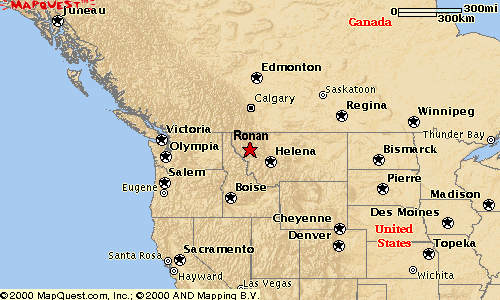 Laurent Henri, whom they called Henri, was
practicing medicine in St. Philippe la Prairie, Quebec and had four
children, Henri,
Laurent
Robert, Ernestine
and Regina (two of
their children had died in infancy). Henri continued to be interested
in the progress of the development of the west, and when the government
asked for young men to go out and help in opening new towns etc.,
he applied and was accepted. He was given a post as government
physician to the
Indians in Ronan, Montana,
in the United States. Hermine was not as enthusiastic as Henri
about the move, but as her mother agreed to go with them, she told
Henri she would be willing to go. Henri arranged for his wife, mother-in-law
and children to follow him in a few months, they would go by train
two-thirds of the way, and then by wagon train. Henri took
the train as far as he could, then bought a horse and joined a train
of pack-horse travellers to destination. He was thrilled with
the country and especially the beautiful sunsets.
Laurent Henri, whom they called Henri, was
practicing medicine in St. Philippe la Prairie, Quebec and had four
children, Henri,
Laurent
Robert, Ernestine
and Regina (two of
their children had died in infancy). Henri continued to be interested
in the progress of the development of the west, and when the government
asked for young men to go out and help in opening new towns etc.,
he applied and was accepted. He was given a post as government
physician to the
Indians in Ronan, Montana,
in the United States. Hermine was not as enthusiastic as Henri
about the move, but as her mother agreed to go with them, she told
Henri she would be willing to go. Henri arranged for his wife, mother-in-law
and children to follow him in a few months, they would go by train
two-thirds of the way, and then by wagon train. Henri took
the train as far as he could, then bought a horse and joined a train
of pack-horse travellers to destination. He was thrilled with
the country and especially the beautiful sunsets.
A CULTURE SHOCK
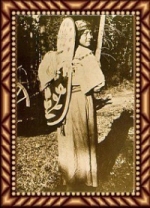 When he arrived in Montana he found he was
the first white doctor the Flathead tribe had
ever had. He was advised too that he would have to care for several
white families of various nationalities spread over an area of some miles
who were settlers. The Indians had their own medicine man and were
very wary of being treated by the white doctor. One of the government
agents stayed with Henri a short time and took him around the area he
was to travel and care for the families settled there. He met a young
priest, who like himself, had just arrived., and who was to cover a large
area taking care of the moral needs of those who wished him to. Henri
was pleased with the house he was given, a large frame house with a fenced
yard and about one-quarter mile from the reservation. The Indians
seemed docile, but were not accustomed to the white man and if they disliked
anyone, they would gather at night and paint themselves and dance about
the fire, and ride out and turn the home of the offender. Henri
was anxious to get on the good side of the Indians, and knew he would
have to work at it, as they were very reluctant to accept him as they
preferred their own medicine man. Henri was somewhat worried at
times at the thought of his wife and family coming out, and wondered how
Hermine and her mother would adapt to this new way of living.
When he arrived in Montana he found he was
the first white doctor the Flathead tribe had
ever had. He was advised too that he would have to care for several
white families of various nationalities spread over an area of some miles
who were settlers. The Indians had their own medicine man and were
very wary of being treated by the white doctor. One of the government
agents stayed with Henri a short time and took him around the area he
was to travel and care for the families settled there. He met a young
priest, who like himself, had just arrived., and who was to cover a large
area taking care of the moral needs of those who wished him to. Henri
was pleased with the house he was given, a large frame house with a fenced
yard and about one-quarter mile from the reservation. The Indians
seemed docile, but were not accustomed to the white man and if they disliked
anyone, they would gather at night and paint themselves and dance about
the fire, and ride out and turn the home of the offender. Henri
was anxious to get on the good side of the Indians, and knew he would
have to work at it, as they were very reluctant to accept him as they
preferred their own medicine man. Henri was somewhat worried at
times at the thought of his wife and family coming out, and wondered how
Hermine and her mother would adapt to this new way of living.
HENRI, BROTHER OF THE FLATHEAD TRIBE
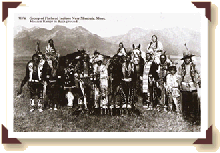 Fortunately for Henri, shortly after his
arrival, he found one of the Indian boys, the nephew of the chief,
quite ill, and with a few gestures and the odd word he had learned
of their dialect, he made the chief understand that he could help
the boy. He understood from the chief that they had faith
in their own ways and Henri left without doing anything for the
boy. The next evening, one of the Indian boys came to him,
he made him understand he was to go with him, so Henri did. When
they arrived at the reservation, he was taken into the tepee where
the sick boy was. Henri found he had a high fever, and he
gave him medication. He was afraid to leave as he could not
give instructions to those with him as they would not understand,
so he stayed with him through the night, and by next morning the
fever had broken and the boy was much better. The medicine
man had performed his treatment just outside the tepee dancing and
chanting, and tried to persuade the chief that he had cured the
boy. The chief who had been with Henri all night, was impressed
by his gentle care and also the little black bag which contained
interesting little vials and instruments. He called the head
men of his tribe and they smoked the pipe with Henri, this was a
great honor and Henri thus became a brother of the Flathead tribe.
The chief was a wise and just man, and with time, he and Henri became
very good friends.
Fortunately for Henri, shortly after his
arrival, he found one of the Indian boys, the nephew of the chief,
quite ill, and with a few gestures and the odd word he had learned
of their dialect, he made the chief understand that he could help
the boy. He understood from the chief that they had faith
in their own ways and Henri left without doing anything for the
boy. The next evening, one of the Indian boys came to him,
he made him understand he was to go with him, so Henri did. When
they arrived at the reservation, he was taken into the tepee where
the sick boy was. Henri found he had a high fever, and he
gave him medication. He was afraid to leave as he could not
give instructions to those with him as they would not understand,
so he stayed with him through the night, and by next morning the
fever had broken and the boy was much better. The medicine
man had performed his treatment just outside the tepee dancing and
chanting, and tried to persuade the chief that he had cured the
boy. The chief who had been with Henri all night, was impressed
by his gentle care and also the little black bag which contained
interesting little vials and instruments. He called the head
men of his tribe and they smoked the pipe with Henri, this was a
great honor and Henri thus became a brother of the Flathead tribe.
The chief was a wise and just man, and with time, he and Henri became
very good friends.
HENRI'S FAMILY ARRIVES
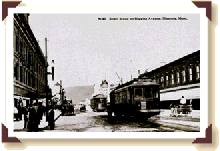
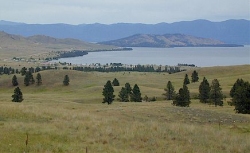 By the
time his family arrived, Henri was becoming accustomed to the new
country and way of living. He loved the mountains just west
of Ronan, called the Bitterroot range, and to the north was a lovely lake called
the Flathead Lake (left picture), and not too far was a town
called Missoula
(right picture) which was fast becoming a city and plans were made
to build a college and many buildings. The first night they were
in the house, the children were very excited about being with their
father and he had many tales to tell them. Hermine and her mother
were very tired and put the children to bed early. She was a small
person and very blond and had long hair, which she used to brush
every night before going to bed. Henri had not had time to
put up curtains in the windows and as she was brushing her hair,
she heard noises and looked at the window; she was terrified
when she saw several Indians with their faces pressed against the
pane looking at her.
By the
time his family arrived, Henri was becoming accustomed to the new
country and way of living. He loved the mountains just west
of Ronan, called the Bitterroot range, and to the north was a lovely lake called
the Flathead Lake (left picture), and not too far was a town
called Missoula
(right picture) which was fast becoming a city and plans were made
to build a college and many buildings. The first night they were
in the house, the children were very excited about being with their
father and he had many tales to tell them. Hermine and her mother
were very tired and put the children to bed early. She was a small
person and very blond and had long hair, which she used to brush
every night before going to bed. Henri had not had time to
put up curtains in the windows and as she was brushing her hair,
she heard noises and looked at the window; she was terrified
when she saw several Indians with their faces pressed against the
pane looking at her.
WHITE ANGEL
 Henri had two dogs, small black and white
terriers, one called Beau and the other Belle. The boys were
so happy and had a lot of fun playing with them. Hermine worried
and did not want the boys to go beyond the yard, but they were,
like their father, adventuresome, and soon were getting out and
before long they were playing with the little Indian children. They
would sometimes go with their father when he visited the Indians
and some of the old Indian ladies or squaws, as they called them,
would give them gifts they had made, shoes or a vest made of deer
hide which they had beaded. They were very sensitive about
the gifts they gave, and you could not refuse to take and wear them.
Soon the children were running around with moccasins and buckskin
suits, and if it had not been for the fact they were fair, one would
have thought them Indian. Henri was anxious for the well-being
of his family and explained to them that it was important the Indians
like them. After the family had been there a short time, he
asked Hermine and her mother if they would make a very large cake
as he wanted to have the chief and some of his men come to the house,
and would like to serve them the cake. When they came into
the house Hermine was so frightened she could not hold the
plate steadily so her mother passed it. Henri had told her
to pass it first to the chief, which she did, but when she held
the cake in front of him, which was cut into small squares, the
chief took the plate and emptied it all into a pocket he had in
his jacket. Poor Mrs.Brunet was flabbergasted, and Henri told
her to get more and serve each just one piece of cake at a time,
and this worked out better. The Indians stared at Hermine and her
mother and gave Hermine an Indian name meaning White Angel.
Henri had two dogs, small black and white
terriers, one called Beau and the other Belle. The boys were
so happy and had a lot of fun playing with them. Hermine worried
and did not want the boys to go beyond the yard, but they were,
like their father, adventuresome, and soon were getting out and
before long they were playing with the little Indian children. They
would sometimes go with their father when he visited the Indians
and some of the old Indian ladies or squaws, as they called them,
would give them gifts they had made, shoes or a vest made of deer
hide which they had beaded. They were very sensitive about
the gifts they gave, and you could not refuse to take and wear them.
Soon the children were running around with moccasins and buckskin
suits, and if it had not been for the fact they were fair, one would
have thought them Indian. Henri was anxious for the well-being
of his family and explained to them that it was important the Indians
like them. After the family had been there a short time, he
asked Hermine and her mother if they would make a very large cake
as he wanted to have the chief and some of his men come to the house,
and would like to serve them the cake. When they came into
the house Hermine was so frightened she could not hold the
plate steadily so her mother passed it. Henri had told her
to pass it first to the chief, which she did, but when she held
the cake in front of him, which was cut into small squares, the
chief took the plate and emptied it all into a pocket he had in
his jacket. Poor Mrs.Brunet was flabbergasted, and Henri told
her to get more and serve each just one piece of cake at a time,
and this worked out better. The Indians stared at Hermine and her
mother and gave Hermine an Indian name meaning White Angel.
ANOTHER CULTURE SHOCK !
Henri was working hard to learn to
speak English and the Flathead dialect, and the children soon learned
to speak with the little Indian children, and as a school had been
set up nearby they learned to speak English. A year after
their arrival they had a son, Ernest.
When the Indians heard this they were happy for Henri and
came to visit the baby boy. As was their custom they bestowed
a special blessing by transferring from one of their heads to the
new baby, a big black lice. Hermine and her mother almost
panicked, this tiny white baby with white blond hair and the big
black lice in it. Henri hurried the Indians out and Mrs.Brunet
immediately extracted the unwelcome 'blessing' from the baby's head,
killed it, and washed her hands and the baby's head.
THE BIRTH OF ARNOLD ZENON
After a few years another son was born to Henri and Hermine, and at that time Henri decided this was to be the last of their family, so he gave him two names, one from the first letter of the alphabet and one from the last. They called him Arnold Zenon. Henri would often have to make calls and be away from home two or more days and he sometimes took one of the boys with him. Laurent Robert was always happy to go with his father. On one occasion, when Laurent had accompanied Henri, they had quite an experience on their way back home. They were riding in a buggy and an electrical storm came up. The horse became frightened and they decided to stop for a time. They pulled up under a clump of trees and waited for the storm to abate and to rest and calm the horse. A bolt of lightening struck and for a few seconds Henri was stunned, then he roused Laurent and they got out of the buggy. The horse was lying on the ground; he had been struck by the lightening bolt and killed. The storm eased up and Henri and Laurent walked to a nearby house where a young couple lived. They brought Henri and his son in and made them welcome. They gave them supper and kept them overnight. The next morning they loaned Henri a horse which they hitched to the buggy and went on home.
RETURN TO CANADA
In 1891 Henri and Hermine decided
they would return to Canada. They had spent eight years in
Ronan. Their son Henri
who was fifteen years old, wanted to stay on and continue his studies
at the college in Missoula. When they arrived in Montreal the children were excited
being in such a large city. Laurent was thrilled with the big buildings
and the fire engines. He would follow after them and was so
fascinated watching the firemen working, he would forget the time
and his mother would be worried.
Laurent Henri died suddenly in 1893.
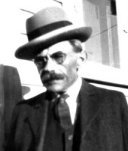 LAURENT ROBERT was born in St. Philippe La Prairie on the
3rd February 1880. He wen with his
LAURENT ROBERT was born in St. Philippe La Prairie on the
3rd February 1880. He wen with his 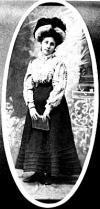 family to Montana. After his father diedhe
went to college in Montreal and later taught in a Business College
both in English and in French. He had cousins who lived in
the country and would often visit them, and one evening they went
to a party in the next town. It was the 25th November which
is the feast of la Sainte Catherine, when they had ‘pull toffee’
parties. They skated to the town early in the evening. They
would make the toffee and when it was cooked would let it cool slightly,
put butter on their hands and each boy would take a ball of candy
and choose a girl to 'pull' with him.
family to Montana. After his father diedhe
went to college in Montreal and later taught in a Business College
both in English and in French. He had cousins who lived in
the country and would often visit them, and one evening they went
to a party in the next town. It was the 25th November which
is the feast of la Sainte Catherine, when they had ‘pull toffee’
parties. They skated to the town early in the evening. They
would make the toffee and when it was cooked would let it cool slightly,
put butter on their hands and each boy would take a ball of candy
and choose a girl to 'pull' with him.
Laurent chose a
very pretty brown-eyed, brown-haired girl called Noemie Seguin. They pulled the toffee and when it had cooled
and was firm, they cut it in pieces. This was fun and a good
way to get acquainted. For Laurent, it was love at first sight.
Laurent was twenty-two at the time and Noemie was sixteen.
He asked her to go out with him. He was very fond of
music and took her to concerts and several times to the opera. He
used to tell Noemie about their life in Montana, and that he would
like to return to the west. He had been thinking of going someplace
near the Rocky Mountains in Canada. The following year he
left for Calgary, Alberta, and had asked Noemie to think about marrying
him and coming to live in the west.
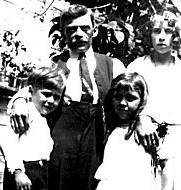
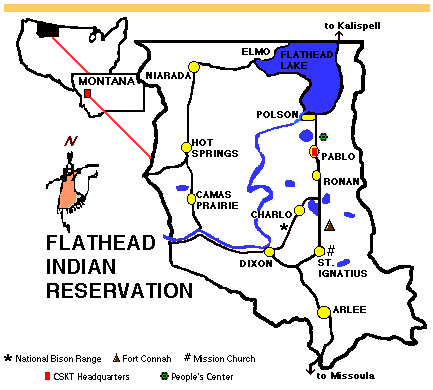 appearance. Although
not warlike, the Salish defended themselves with great bravery against
their enemies, the Blackfoot. In 1885, after ceding their land by
treaty to the United States, the Salish, Kootenai, and Upper Pend
d'Oreille people were placed on reservations in northwestern Montana.
(Source :
appearance. Although
not warlike, the Salish defended themselves with great bravery against
their enemies, the Blackfoot. In 1885, after ceding their land by
treaty to the United States, the Salish, Kootenai, and Upper Pend
d'Oreille people were placed on reservations in northwestern Montana.
(Source : 